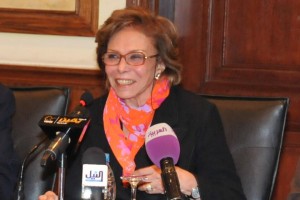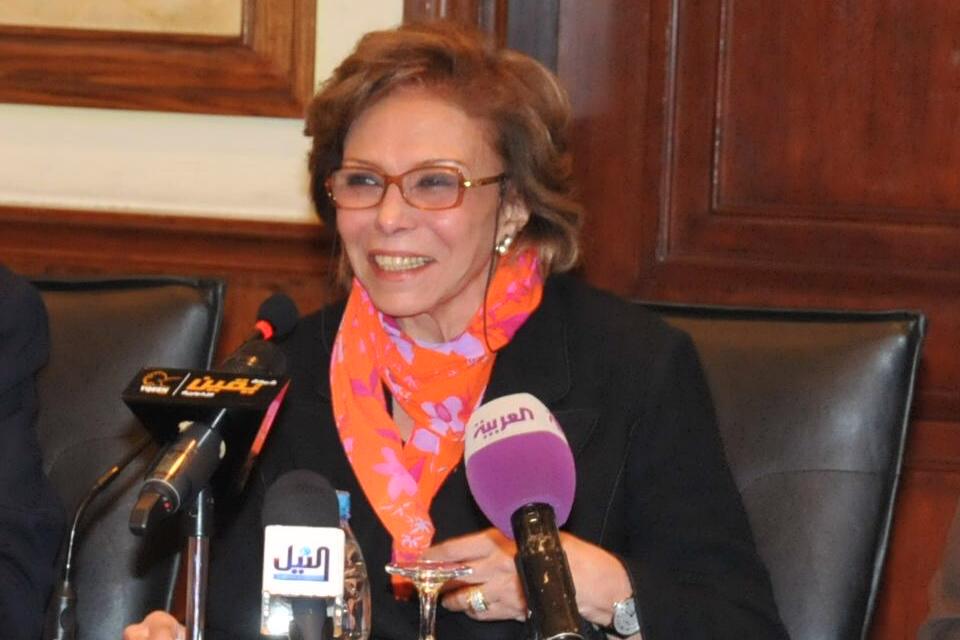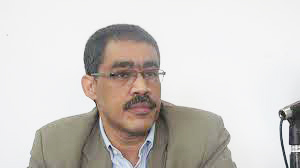
(Photo by: National Council for Women Facebook page)
The National Council for Women (NCW) head Mervat Al-Tellawi denied that the final draft of the United Nations declaration on violence against women contains any of the ten points criticized by the Muslim Brotherhood.
The Muslim Brotherhood released a statement last week denouncing the declaration for “contradicting principles of Islam and destroying family life and the entire society”. The declaration is the outcome of the UN 57th Commission on the Status of Women, held in New York from 4 March to 17 March.
Al-Tellawi, who was among Egypt’s delegation to the commission, said in a press conference held on Thursday by the NCW; “The declaration is facing an instigated campaign.”
Al-Tellawi referred to a statement released by the International Union for Muslim Scholars (IUMS) denouncing the declaration. She stated that the statement was released on 28 February, a week before the commission began. The IUMS is headed by Youssef Al-Qaradawy, Egyptian Islamic scholar and Muslim Brotherhood affiliate who is currently the Mufti of Qatar.
The exact contents of the statement reappeared once more in the Muslim Brotherhood’s statement said Al-Tellawi. The Brotherhood’s statement was released two days before the declaration passed. “The points mentioned in both statement have no relation whatsoever to the final declaration,” said Al-Tellawi.
The points include: granting girls sexual freedom, providing contraceptives for adolescent girls and legalising abortion “in the name of reproductive rights”, granting equal rights to homosexuals and protecting and respecting prostitutes, allowing wives to legally accuse their husbands of rape or sexual harassment, allowing equal inheritance rights among men and women, full equality in marriage legislation (which would allow Muslim women to marry non-Muslim men), and abolishing the need for husbands’ consent on matters such as their wives’ work, travel or going out.
Al-Tellawi stated that matters such as homosexual rights and abortion were indeed discussed during the commission. “Some Western countries and states such as Brazil and South Africa wanted to include them in the declaration,” Al-Tellawi said. “Yet with the efforts of the developing countries, including Egypt, we were able to negotiate with them and persuade them to remove such articles from the declaration.”
The NCW head criticised what she described as “the Muslim Brotherhood’s constant attempt to involve religion in women-related matters”. She stated that the Organisation of Islamic Cooperation (OIC) released a statement expressing gratitude for the declaration upon its passing. “The OIC also recommended that religion is not used to promote violence against women, giving Female Genital Mutilation (FGM) and child marriage as examples of such violence,” Al-Tellawi said.
Al-Tellawi detailed the contents of the declaration; a full copy of which was distributed among the attendants. She said the declaration succeeded in giving violence against women a broader definition which includes a socio-economic definition. According to the declaration, poverty and hunger are considered forms of violence against women.
The declaration also called for protecting elderly women and advocates against violence against women, Al-Tellawi said. She added that the declaration “lights the path for legislations abolishing violence against women”.
“If the Muslim Brotherhood rejects this declaration, what do they have to offer that can end violence against women?” Al-Tellawi questioned.
The declaration received mixed reactions upon its issuance. Women’s rights advocates and liberal groups praised the agreement, while religious conservatives claimed it will destroy civil society.




